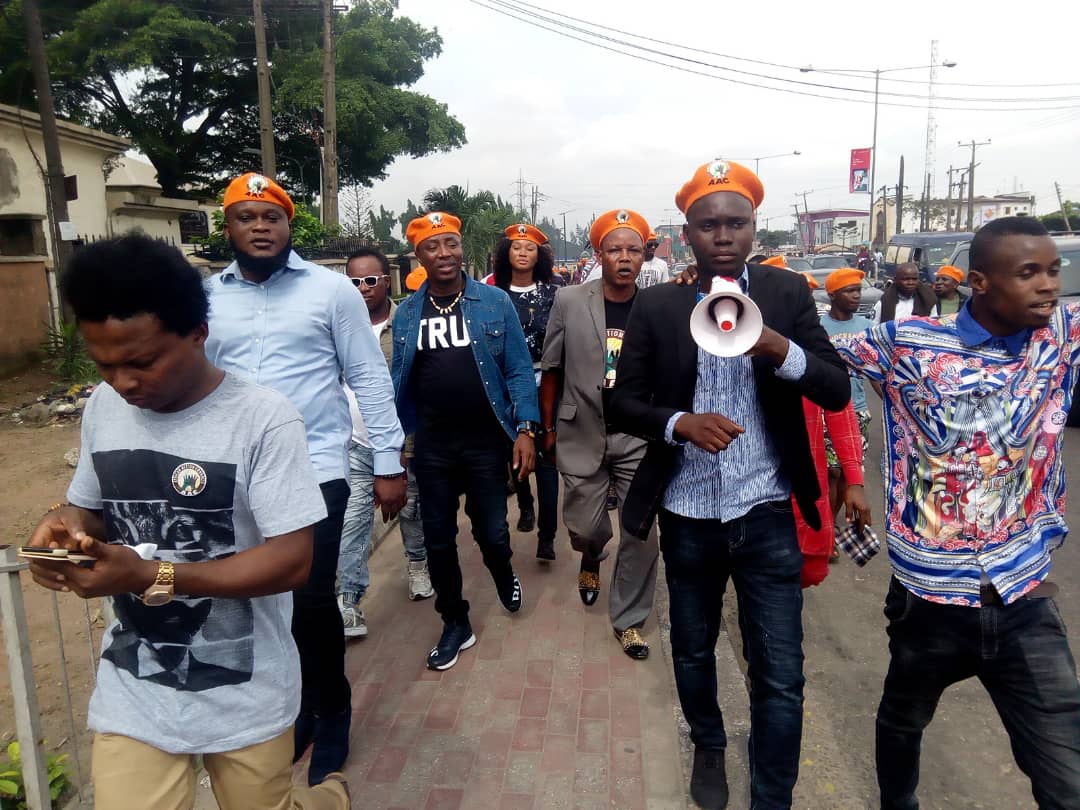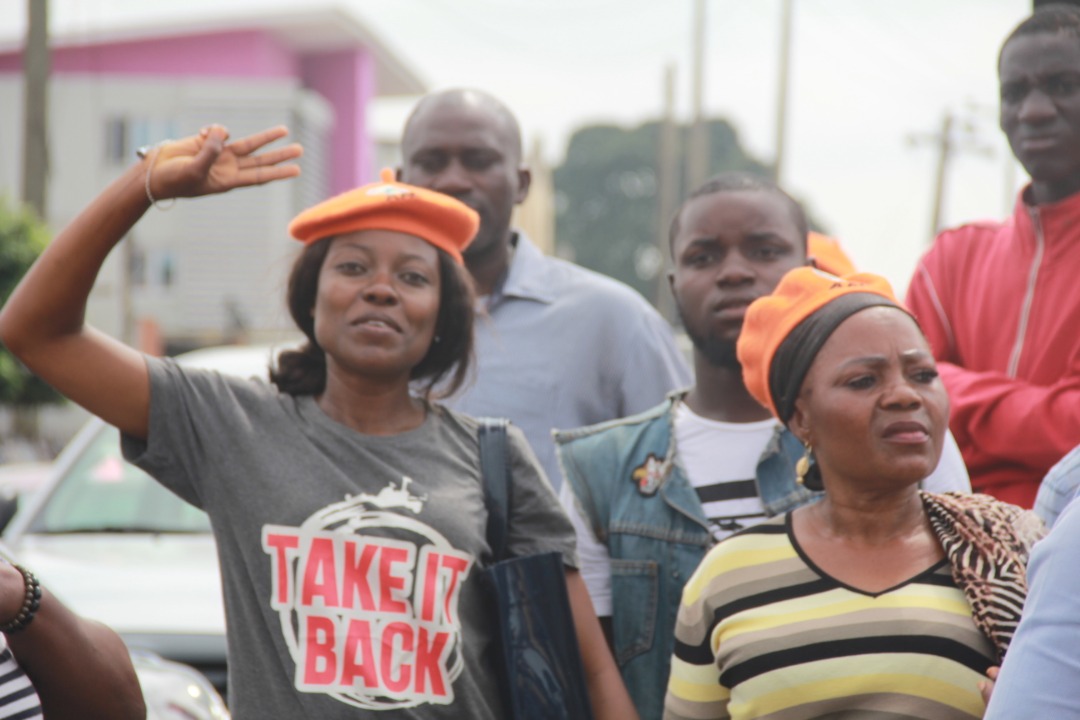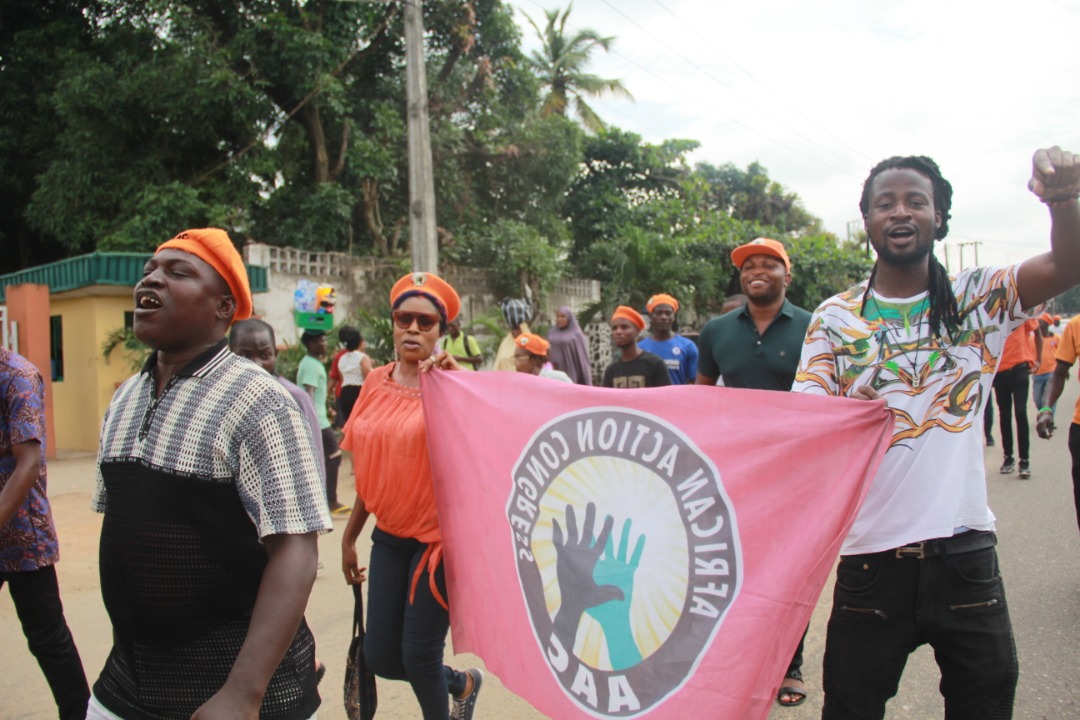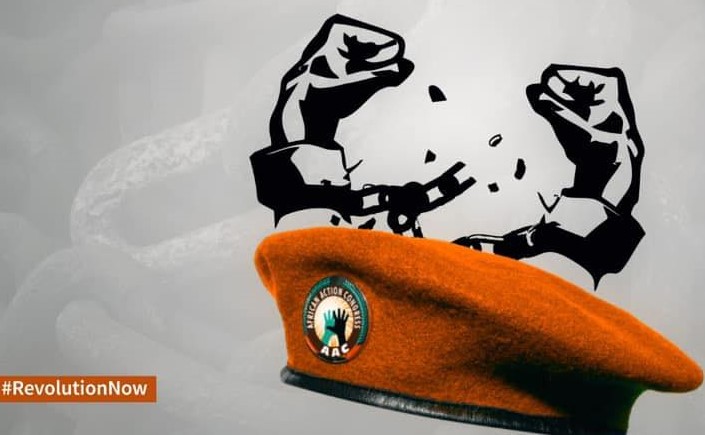Justice Inyang Ekwo of the federal high court in Abuja wrote his name with the ink of ignominy into the history books on 12 July when he ruled in favour of the purported suspension of Omoyele Sowore and Malcolm Fabiyi as National Chair and Deputy National Chair respectively, of the African Action Congress (AAC). But his “jankara judgment” cannot stop the revolutionary idea AAC represents, because it is an idea whose time has come.
This much has been made clear with action, over the last week. The AAC Lagos branch set the ball rolling with a press statement that same day, followed up with a press conference addressed by Kunle Wizman Ajayi, the party’s Lagos state chair on Monday 15 July, where it rejected the “cut and sew” judgment. Agba Jalingo, the Cross Rivers state Chair of the party was also at the conference, and equally condemned the judgment and Leonard Nzewa’s fraudulent claim to the party’s leadership.
A mass rally was held immediately after the press conference. This pressed home the stance of AAC as a party for revolution. Addressing the rally, Omoyele Sowore, the AAC National Chair, made it clear that:
“We came out here as members of the African Action Congress; first, to warn the people who are trying to hijack our party that our party is not hijackable, but most importantly to start preparing Nigerians for…a revolution”.
Leonard Nzewa and his co-travellers are merely pawns in an unfolding struggle for the soul of Nigeria between forces with the aim of revolutionary transformation of society such as AAC and those which want to maintain the status quo of exploitation and oppression of the working masses. Behind the questionable Ekwo judgment is the reactionary forces of the bosses fighting back against the revolutionary idea and organisation of AAC.
As working-class people and youth activists, we need to put the judgment in its proper perspective. And even more importantly, we have to contextualise what AAC represents as idea and organisation, and thus equip ourselves theoretically and politically in the revolutionary struggle for our self-emancipation.
The making of an infamous judgment
 Leonard Nzewa, who used to be the party’s National Secretary, announce the suspension of Omoyele Sowore and eight others for a period of six months, on 13 May 2019, whilst laying claim to a non-existing “acting National Chairman” position.
Leonard Nzewa, who used to be the party’s National Secretary, announce the suspension of Omoyele Sowore and eight others for a period of six months, on 13 May 2019, whilst laying claim to a non-existing “acting National Chairman” position.
Nzewa who had been suspended on 17 January for “dereliction of duty as National Secretary; anti-party activities; and financial impropriety” was then immediately expelled. The Independent National Electoral Commission further belied the kangaroo “National Executive Committee” meeting Nzewa claimed he had organised, and duly recognised Sowore as Chair of the party.
The response from AAC branches was even more profound. Across the length and breadth of the country, support for Sowore was expressed by leaders of the party in not less than 30 of the 36 states of the federation, cutting across all the six geopolitical zones. In desperation, Leonard Nzewa and his cohorts headed to court on 17 May, with support from Mr Nyesom Wike, governor of Rivers state.
The ruling secured by Nzewa barely two months after, is nothing but a hollow, flash in the pan “victory”. As AAC noted in a press statement issued after the infamous judgment, “Justice Ekwo refused to consider the legal defense of Mr. Omoyele Sowore and Dr. Malcolm Fabiyi, ruling that the suit was ‘uncontested’”.
This was on the bogus ground that the 65-page counter affidavit and its 12 exhibits were deposed to on their behalf by Dr Adeoye, the AAC Deputy National Secretary, and not physically by the two comrades despite evidence being made available that they were not in the country at the time. But the only reason why Justice Ekwo decided to contrive a supposedly procedural gap for delivering his Justice Bassey Ikpeme-like judgment is that there is no way a case could be substantively made!
The issues at stake are far beyond legal technicalities. AAC is a political party of a new type in 21st Nigeria. AAC has not simply been an electoral machine or an attempt at being one, as is the case with your typical INEC-registered political party. It is a radical-democratic party which has boldly called for Revolution Now!
The social forces which benefit from the exploitation of the working masses and poor youth – the bosses and their minions who benefit from the oppression of the immense majority of the population – will do everything possible to smash the party. But the party represents an idea whose time has come. If we appreciate the tasks history places on our shoulders and tenaciously advance the mass line of struggle, AAC will fulfil its role as the catalyst for the self-emancipation of working-class people and youth.
In The Wretched of the Earth, Frantz Fanon said “Each generation must, out of relative obscurity, discover its mission, fulfill it, or betray it”. AAC as a party, is an organisational manifestation of this generation’s discovery of its mission. We have to put this rising from “inconsequential” obscurity in context, towards fulfilling our mission of revolutionary transformation.
The soil; an era of crises and revolts
 The world changed ten years ago, entering an era of crises and revolts. The capitalist system is in the throes of an organic crisis like never before, encompassing economic, political, ideological and environmental dimensions all intertwined.
The world changed ten years ago, entering an era of crises and revolts. The capitalist system is in the throes of an organic crisis like never before, encompassing economic, political, ideological and environmental dimensions all intertwined.
In the midst of the longest economic depression for generations, a handful of billionaires and millionaires have become richer and richer whilst half of the world population live in abject poverty (and in Nigeria, a handful of billionaires’ wealth while the country has the largest number of poor people on the planet). This situation has led to the acquired political legitimacy of establishment parties being practically questioned on the streets with revolts and revolutions, across the world.
We have seen this rude intrusion of the masses into politics in; the 2011-2012 Arab Spring and more recently revolutions in Sudan and Algeria; anti-austerity movements in Spain, Portugal, Greece; the Citizens Broom (Balai Citoyen) movement which sparked an uprising in Burkina Faso; Occupy Wall Street movement; the Bernie Sanders movement in the United States; Jeremy Corbyn’s emergence in Britain; challenge to the ANC’s domination of electoral politics in South Africa and defeats of hitherto dominant parties in elections across several countries.
In Nigeria, the January 2012 Uprising was the turning point. Its description as “Occupy Naija” reflects the fact that it was part of the (still ongoing) global reawakening of the working masses. But the immediate beneficiaries of our partial victory over Goodluck Jonathan and the PDP on the battlefield were the sections of the ruling class that had been in opposition, which became the APC.
They rode on the crest of the mass yearning for change, not just because they lied through their teeth about being different from the anti-poor PDP, in spite of having many former PDP stalwarts on its leadership. It was also not simply because of General Buhari who presented himself as an anti-corruption campaigner. If it were that simple, he would have won earlier elections.
A crucial reason why APC could win power was precisely because it arose as an organisation, through a social movement from above, which involved mergers that gave birth to that party barely a year after the January Uprising. The absence of a revolutionary alternative of any significant clout to the APC made it a pole of attraction for many genuine change-seeking working people and youth in the 2013-2015 period, paving the way for its defeat of PDP at the polls.
The Buhari/APC’s campaign platform had three legs; defeating Boko Haram and enthroning security, tackling unemployment and addressing the economic crisis and, fighting corruption to a standstill. It failed on each of these. The party has maintained a well-oiled propaganda machinery regularly does its utmost to “turn green into white” as Fela would say. It has also used the “excuse” of sixteen years of PDP’s shameless and corruption infested reign of incompetence to call for patience, so often that has lost all meaning. It was thus impossible to restore the extent of mass illusion it had been able to stir in the pot of change mantra in 2015, when it decided to cook its “next level” stew this year.
The new parties and search for real alternatives
It was within this context that dozens of new INEC-registered parties of different sorts emerged in 2018, bringing the total number of official parties in the country to the record number of ninety-one. More than three quarters of these contested for the presidency.
Before going further, it is important to try have a clearer understanding of parties in general and INEC-registered parties in particular.
The Guardian in a recent editorial succinctly puts it thus:
“A party is an aggregation of individuals with similar interest or vision of the development of their society. These individuals bind together within a framework that allows them to contend for political power. In a class society such as ours, a party is that section of a class that is conscious of its interest and gives vent to it by seeking to control power relations to realise its interest.”
It is thus not the registration of a political organisation that makes it a party. It is, distinctness of ideology which represents the interests of a class (or section of it), and contention for political power. On this, the newspaper also says: “The greatest strength of any political party is its links with the people.” It is thus not enough to ideologically represent a class and claim to contend on its behalf. There has to be some demonstrable level of political capacity which becomes real only with links with the people.
What distinguishes an INEC-registered party is the legal right to contend within the electoral framework for government. But government does not necessarily translate into power. It is at best merely the tip of the iceberg of political power. This is why IBB once said, “we are not only in government, we are in power”.
Political power is domiciled in the state, which is the “bureaucratic-military machinery” used by the ruling class to defend its ultimate social-economic power. The billionaires and other big property owners i.e. capitalists keep exploiting the poor working-class people because they have this economic power. Thus, irrespective of it being PDP, APC or any other party of the bosses that is in government, except we smash the capitalist state, the big property owners like Aliko Dangote, Femi Otedola, Theophilus Danjuma, Otedola, Emmanuel Iwuanyanwu & Co, are always in power.
There are two very important issues that arise from this understanding. First, a real alternative to PDP and APC and the exploitative system they both represent, must of necessity be a revolutionary alternative. Second, because the electoral system is based on a framework which takes the oppressive system of the bosses as given, a revolutionary party cannot restrict its politics to the hollowed haven of INEC’s anointing.
Our emancipation will not be won at the ballot box. As Lucy Parsons said over a hundred years ago: “Never be deceived that the rich will allow you to vote away their wealth.” Our labour is what creates the social wealth as the NLC motto tells us. We need a revolution to take it back.
Revolutionaries, elections and politics
 The primacy of extra-parliamentary mobilisation of the working masses power does not mean elections are not important or that revolutionary activists should not be involved in the electoral process. During periods of elections, more and more working-class people and youths who ordinarily would not be interested in politics get involved in political discussions. This presents a great opportunity for revolutionary parties to engage millions of people with our ideas and build our forces by winning more people to our politics.
The primacy of extra-parliamentary mobilisation of the working masses power does not mean elections are not important or that revolutionary activists should not be involved in the electoral process. During periods of elections, more and more working-class people and youths who ordinarily would not be interested in politics get involved in political discussions. This presents a great opportunity for revolutionary parties to engage millions of people with our ideas and build our forces by winning more people to our politics.
Involvement in elections also helps us to gauge the nature and level of consciousness of our class at those particular moments, as well as our strength in the immediate instance. We must however note that consciousness of the masses and the relative strengths of parties and political organisations could swing sharply. A spark of discontent could light the fire of a mass movement beyond the wildest expectations of radicals and revolutionaries. An example of this was how the annulment of the June 12 elections in 1993 resulted in a revolutionary situation which raised Campaign for Democracy from being a marginal coalition of radical groups to a leading political force, seemingly overnight.
In 20th century post-independent Nigeria, elections often ignited deep political crisis which undermined the legitimacy of the bosses’ class. This was the case in 1966, 1983 and most significantly in 1993. However, weaknesses of radical and revolutionary forces paved the way for the military to come in as Caesar or Bonaparte, and eventually restore capitalist law and order in some form or the other.
Elections could also serve as openings for deepening an expanding movement of revolt of the oppressed, leading to victory at the polls for a radical or revolutionary party. Examples of this include the electoral victory in 1970 of Salvador Allende’s Popular Unity Coalition in Chile, and that of Hugo Chavez in 2002. But elections could also serve as means of consolidating the counter-revolution’s power in revolutionary situations such as more recently in Egypt.
Democracy from below i.e. rooted in the establishment of organs of working-class people’s power in the workplaces and communities, and not from above i.e. resting on the authority of parliaments has to be at the heart of the revolution.
And when revolutionaries are elected into parliament during periods of “normalcy”, we must use such platforms to discredit the bosses’ rule, as the Economic Freedom Fighters in South Africa do, to some extent. To do so, we must not only push for the most radical of reforms, but also argue against the limits of reformism.
Politics is essentially about power. It Is not something done only every four years or so, as electoral campaigns. Formally and informally; through its control of the workplace, in boardrooms and on golf courses, in lawn tennis clubs and at social events, the bosses’ class play politics i.e. wield power, reaching decisions and taking actions that further our being exploited and oppressed, in their own interests.
Revolutionary politics challenges the power of the bosses and helps oppressed people build their capacity to overthrow the rule of the bosses. Revolutionary politics is thus activist politics, which tears asunder the artificial boundaries that the bosses try to confuse us with between governance, the economy and social life.
When as AAC we fight against the sacking of workers, for free and qualitative education, for electricity for all, etc, this is politics, from below. The centrality of politics in our activities as revolutionaries is forged by concentrating the rivers and streams of our actions of resistance together into an ocean of revolution, instead of taking them as mere episodic acts of defiance. It is about building power in the now, to take back the essence of our being, which is freedom.
Party formation, consciousness and revolution
As with most parties, revolutionary parties are not simply decreed into being. They emerge from movements, which represent the interests of a class (or alliances of sections of classes). The relationships between classes, movements and their parties are however not linear. They are formed and shaped in the real world of politics, which they then equally act upon to shape.
For the traditional parties of the bosses, this process is often relatively much clearer. As we pointed out earlier, the ruling class’ political power is closely tied to the primary category of its place in the class structure of society i.e. economic power. There is however a third facet of its power, which is of exceeding importance as the cement which holds the blocks of its authority at foundational (economic) and super-structural (political) levels together. This is ideological and made manifest in a thousand and one ways through the entire spectrum of socio-cultural life.
The dictatorship of the bosses (even in its most apparently democratic form) is made to appears to us as natural. It becomes “common sense” to see the ways of the bosses as the one and only true way to run society. Therefore, it is somehow taken as given that the rich man who does not himself sweat like the worker in the factory is entitled to the wealth which is created by the labour of the worker – we should all rather hope to become rich like the millionaire, or (as most will) die trying. Therefore, it is somehow taken as given that if you cannot beat them join them i.e. play politics like the bosses play it.
The dominant ideology in society is clearly the ideology of the dominant class. It sows and waters the seeds and flowers of “false consciousness”, which helps to legitimize the bosses’ economic and political control. But lived reality is very complex, and wool of false consciousness hardly ever fully covers our inner eyes.
The blows of everyday life such as: poor pay; job losses or no work; police brutality; terrible living conditions on campuses and in communities; no water, electricity etc; and, unaffordability of quality education and healthcare, to mention a few, sow seeds of a different kind of consciousness, one which is more in tune with the objective conditions which are the steel with which the chains of exploitation and oppression are weighted on our feet. This is a consciousness of rebellion. It puts in our heads and hearts the good sense of what the future can be when we fight to win it – a future of our emancipation, won by us through our struggle.
Like the left and right hemispheres which together make up the brain, the false consciousness of “common sense” and the rebellious consciousness of “good sense” are ever together, in periods of normalcy, defining the social psychology.
In revolutionary periods, the cloth of legitimacy which covers the bosses’ body is shredded and their nakedness of oppression revealed in its ugly relief. Common sense is shattered, and good sense comes to the fore. Contradictory consciousness is superseded by the consciousness of “revolution time”, as the mases enter the arena of politics.
Revolutions could and do burst out even where there are no revolutionary parties. There is always a spontaneous element in the making of revolutions, particularly in their opening moments. However, politics is never merely borne of the spirit of spontaneity, at any level. Organisation is critical as catalyst, to feed the fires of revolution as well as for its triumph.
To play such role of organisation, a party must place the actuality of revolution at the centre of its politics, not only when revolution comes, but in its everyday rhythm of work, and at each step of its way forward.
AAC as “serious politics” of the radical left
 The political impact Take It Back/African Action Congress has made in the last seventeen months, is the most profound by any radical political group in 21st century Nigeria. The response of the traditional left has however largely been lukewarm at the best. Some less charitable groups, under the influence of their masters in London have even been outrightly hostile, just stopping short of describing AAC as a CIA project. But the bosses have been clearer in understanding the systemic threat AAC poses to them, even in an inchoate state.
The political impact Take It Back/African Action Congress has made in the last seventeen months, is the most profound by any radical political group in 21st century Nigeria. The response of the traditional left has however largely been lukewarm at the best. Some less charitable groups, under the influence of their masters in London have even been outrightly hostile, just stopping short of describing AAC as a CIA project. But the bosses have been clearer in understanding the systemic threat AAC poses to them, even in an inchoate state.
The state (with it its coercive machinery and judiciary), and the media establishment were swift in their attacks, and they have not relented. Five members of the party were arrested in December for pasting posters of Sowore for president. The Nigeria Electoral Debate Group shut the party out of the main and most widely broadcast presidential debate, which turned out to be a sham, despite all pointers to the party being a leading force amongst the new parties, three of which were invited. Sowore’s protest at the court was thrown out. The jankara judgment of Mr Ekwo is just the latest in the series of intrigues by the capitalist establishment, against the party.
Understanding what the TIB/AAC has been, is and is becoming requires a theoretical approach of the totality on one hand, and “taking power seriously” on the other.
The formation of Take It Back movement at the beginning of 2018 was outside the traditional left. At the heart of this was a broad spectrum of professional middle-class patriots and nationalists. Many of these had been active, albeit in different ways and to different extents, in the students and prodemocracy movements during “June 12”. These of course included the likes of Leonard Nzewa, at the earlier stage of the movement and helps explain the bourgeois-liberal programme of TIB, which fed into the manifesto of the party.
There is no doubt that provisions which in anyway promote Public Private Partnerships, for example, have to be challenged. At the very least as research shows, PPPs do not work. And more importantly, it is antithetical to a revolutionary agenda. With the further march of the party towards “revolution now”, such elements of the party’s programme, which are quite similar to the Labour Party’s initial programme cannot but be scorched in the furnace of the party’s evolution.
This evolution has increasingly seen the expansion of the presence and influence of working-class youth in the party, as well as the rising radicalisation of layers of the professional middle-class. At the heart of this development has been mass mobilisation, which has inspired tens of thousands across the country and globally, with many taking concrete steps to support the party and the idea of thoroughgoing change it represents.
Between March 2018 and the elections in February, over 500 events were organised in more than 15 countries, including townhall meetings in almost all the states of the federation. And N157,884936.98 was raised as donations, duly accounted for. New communication technology was equally used, helping to undermine the near blackout of the campaign by the mainstream media.
More importantly, the party has continued to forge strong linkages with working-class people and youth in their communities and campuses. It has organised several mass meetings and been pivotal to at least a dozen demonstrations, for; electricity rights in working-class communities, against the sack of workers, for the reinstatement of expelled students, etc. It has equally organised symposiums and seminars. And in August it will commence what will be a sustained series of political workshops for activists.
In a 1918 report of the Bolsheviks Central Committee, Lenin pointed out that “politics begin where millions of men and women are; where there are not thousands, but millions, that is where serious politics begin”. AAC represents a practical step forward for serious radical and revolutionary politics beyond abstract claims of representing the millions and not millionaires.
In lieu of a conclusion
The formation of the Take It Back movement at the beginning of 2018 reflected the spirit of the time we are in, globally – albeit belatedly, as the inheritor of the spirit of the January 2012 Uprising. And the birth of the African Action Congress, barely eight months later in August, was catching up with the lost time. To illustrate what I mean here, it would be useful to understand the current era of crises and revolts in phases. Warts and all, Spain gives a sharp example of this. A movement, los Indignados captured the first phase of this era. It flowered into the party Podemos.
This point of departure for our conclusion is important in several ways and at several levels. On the positive side it points at what AAC’s taking it back is in essence i.e. turning indignation into struggle for political change. But it also gives an apt picture of the pathway not to follow. Radical-reformist parties such as Syriza and Podemos rose on mass movements of working-class people and youth, only to lead the march forward into a backward spiral of defence of the system.
The truth is always concrete. And in moving forward, we do not have maps. But we have the compass of theory and history, including unfolding history. The Achilles heel of radical-reformist parties has been the reification of parliamentary politics. Unfurling the banner of #RevolutionNOW, represents a major surge forward for AAC which must be defended and deepened.
Internal party democracy is vital for AAC to fulfil the tasks thrust on it by history. Programmatic and political issues must always be debated without guile. This must continue to be done in a non-sectarian manner which recognises the different currents within the party, with commitment to revolutionary struggle as our collective point of departure.
To those on the traditional left who fail to see the wood for the trees, we cannot but draw their attention to the fact that Revolution:
“cannot be anything other than an outburst of mass struggle on the part of all and sundry oppressed and discontented elements. Inevitably, sections of the petty bourgeoisie and of the backward workers will participate in it—without such participation, mass struggle is impossible, without it no revolution is possible—and just as inevitably will they bring into the movement their prejudices, their reactionary fantasies, their weaknesses and errors. But objectively they will attack capital.”
The system has failed us. With love from Sudan, “Revolution time” is the idea whose time has come. AAC is building a movement of “the inconsequential” working-class people and youth for #RevolutionNOW
Workers & Youth, Unite & Fight!
by Baba AYE









